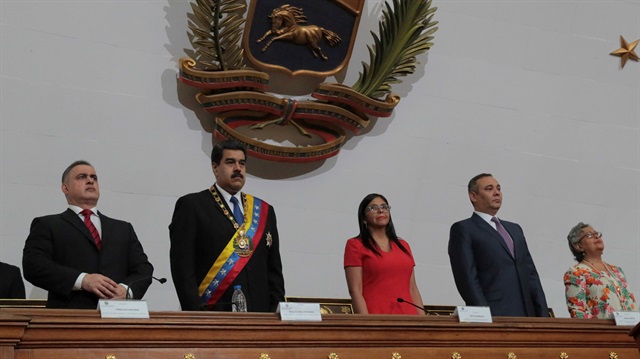
Thirty-three magistrates from Venezuela’s top court were sworn in at a ceremony in the U.S. on Friday to begin operating in exile.
The Supreme Tribunal of Justice (TSJ), designated by the National Assembly in which the opposition holds the majority, took the oath of office at the headquarters of the Organization of American States (OAS) regional bloc in Washington.
The justices will begin work Oct. 13 and the TSJ will be called the Supreme Court in Exile.
“We have managed to integrate a tribunal thanks to the international support and above it all, thanks to Venezuelan people,” Miguel Angel Martin, who was named chairman of the TSJ by the National Assembly, said at the ceremony that was attended by OAS Secretary-General Luis Almagro.
“We will perform legal acts based on the public international law. We will protect Venezuelan people from humanitarian harassment, money laundering and the ongoing corruption inside the Venezuelan government. We will put a face and a name to those governors who have sank Venezuela into a political crisis,” he added.
Almagro said “sanctions are the path to bring the Venezuelan regime to its knees”.
The U.S. has imposed sanctions and threatened military action against the government of President Nicolas Maduro.
Venezuelan lawmaker Sonia Medina attended the ceremony to certify the high court’s actions and said it sets a precedent.
“The TSJ’s installation and operation is a crucial event, because it’s the first time that this situation is happening in America and is even allowed by the OAS reginal bloc. The magistrates who are not located in Washington will hold sessions from Bogota or different embassies,” Medina said.
The magistrates designated by the Parliament have been holed up for more than two months in embassies in Caracas or exiled in other countries. One is under home detention in Venezuela.
“The decisions taken by this tribunal will be executable, but what’s really complicated here is that the Venezuelan dictatorship will not allow [the tribunal] to adopt its rulings in the country. The Supreme Tribunal of Justice exiled is legitimate and will prioritize lawsuits against human rights violations in Venezuela,” said lawyer Carlos Ramirez Lopez.
The National Assembly stripped authority from the TSJ and canceled its operation in Venezuela because some magistrates were loyal to the controversial ruling National Constituent Assembly.
The exiled magistrates will be recognized by the OAS and the 12 regional countries that in August signed the Lima Declaration that found actions by the Maduro government unconstitutional.
Maduro in April signaled Venezuela would abandon the OAS, which it accused of helping to foment economic and political instability as part of a plan by Washington to enable a collapse of the government.
Venezuela’s exit from the OAS cannot take place until 2019.
Maduro has threatened the magistrates elected by the National Assembly with jail time, prompting Colombia, Chile, Mexico and the U.S. to offer political asylum to the magistrates.
*Daniela Mendoza contributed to this article from Bogota, Colombia.














